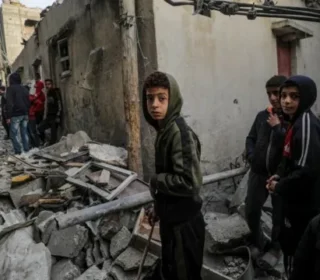The Impact of the Israel and Hamas Conflict on Global Affairs
The ongoing conflict between Israel and Hamas, which has escalated into a full-scale war on multiple occasions, has far-reaching implications for global affairs. This protracted conflict not only affects the people living in the region but also has significant consequences for international relations, security, and the overall stability of the Middle East. In this article, we will explore the various ways in which the Israel and Hamas war impacts global affairs.
1. Regional Instability
The Israel and Hamas conflict contributes to the already volatile and unstable nature of the Middle East. The region has long been a hotbed of political tensions, religious conflicts, and power struggles. The ongoing war exacerbates these issues, further destabilizing the region and increasing the risk of broader regional conflicts.
Neighboring countries such as Lebanon, Syria, and Jordan often find themselves drawn into the conflict, either directly or indirectly. This has the potential to escalate tensions and trigger a chain reaction of violence and instability across the region. The impact of this regional instability is felt not only by the countries directly involved but also by their allies and the international community as a whole.
2. Humanitarian Crisis
The Israel and Hamas conflict has had a devastating impact on the civilian population, leading to a severe humanitarian crisis. The violence and destruction caused by the war result in the displacement of thousands of people, loss of lives, and the destruction of critical infrastructure such as hospitals, schools, and homes.
The humanitarian crisis extends beyond the immediate conflict zone, as the influx of refugees and displaced persons puts a strain on neighboring countries and international humanitarian organizations. This, in turn, has implications for global affairs, as countries and organizations are forced to allocate resources and provide aid to address the urgent needs of those affected by the conflict.
3. Geopolitical Implications
The Israel and Hamas conflict has significant geopolitical implications, with various global powers involved in the region. The conflict serves as a proxy battleground for larger geopolitical rivalries, with countries such as the United States, Russia, and Iran supporting different sides.
The involvement of these global powers in the conflict can further complicate the situation and hinder efforts to find a peaceful resolution. It also highlights the broader geopolitical interests at stake, including control over strategic resources, influence in the region, and the balance of power between different actors.
4. Impact on International Relations
The Israel and Hamas conflict has a profound impact on international relations, straining diplomatic ties between countries and affecting alliances and partnerships. The conflict often leads to polarization and deep divisions within the international community, with different countries taking sides based on their own interests and ideological positions.
Efforts to broker peace and mediate the conflict become challenging when countries are divided and unable to find common ground. This can hinder international cooperation on other pressing global issues and impede diplomatic efforts to address other conflicts around the world.
5. Rise of Extremism and Radicalization
The Israel and Hamas conflict has the potential to fuel extremism and radicalization, both within the region and beyond. The protracted nature of the conflict, coupled with the loss of lives, displacement, and perceived injustices, can create a breeding ground for radical ideologies and militant groups.
The rise of extremism and radicalization has global implications, as it increases the risk of terrorism and poses a threat to international security. This necessitates a comprehensive and multifaceted approach to address the root causes of radicalization and prevent the spread of extremist ideologies.
Conclusion
The Israel and Hamas conflict has far-reaching implications for global affairs. It contributes to regional instability, exacerbates the humanitarian crisis, has significant geopolitical implications, strains international relations, and increases the risk of extremism and radicalization.
Efforts to achieve a lasting and peaceful resolution to the conflict are crucial not only for the people directly affected but also for the stability and security of the entire region and the world at large. International cooperation, diplomacy, and a commitment to addressing the root causes of the conflict are essential in mitigating its impact on global affairs.

















